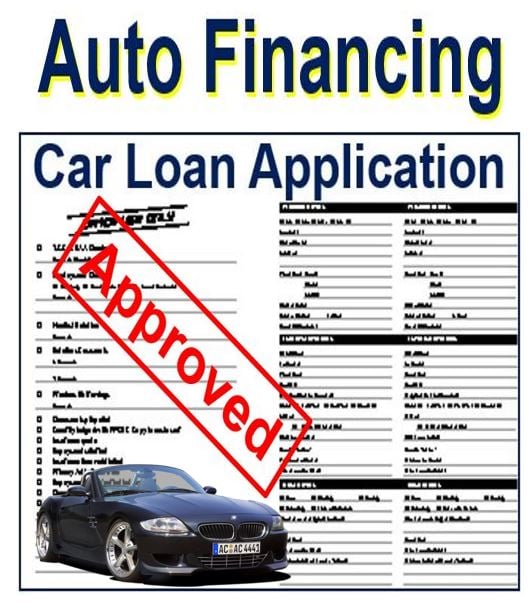Auto financing, also known as car finance, car financing or auto finance, refers to the range of financial products available that allow people to acquire a car with any arrangement other than a full-cash single lump payment (outright payment).
The provision of car finance, usually by a bank or some kind of financial institution, allows consumers to pay the dealer or manufacturer, even though they not have the money, i.e. car finance allows the consumer to buy a car by borrowing the money so that the seller can be paid.
Auto financing is widely used both by members of the public and businesses. A wide range of finance products are available. Business contract hire, which can provide tax and cash flow benefits, is very popular among companies.

According to the Federal Trade Commission (FTC), America’s consumer protection agency, consumers and businesses have two financing options: 1. Direct Lending. 2. Dealership Financing.
Direct Lending
In direct lending, the purchaser gets a loan directly from the lender, which is usually a bank, finance company or a credit union. The consumer agrees to pay back the loan over an agreed period, with interest plus a finance charge.
Once the customer enters into a contract with a dealership to purchase a car, he or she uses the loan from the direct lender to pay for it.
The FTC advises consumers to shop around and ask several lenders directly about their credit terms before agreeing to purchase a specific automobile.
With direct lending, customers know what the credit terms are in advance. By obtaining the financing before purchasing the car, they will know their rate and other terms while they shop.

Make sure the personal loan is not secured against your home. You don’t want to be putting your home at risk if you cannot manage to keep up with repayments.
Dealership Financing
Dealership financing simply means getting financing through the sellers – the dealership. This time the contract is between the dealer and the customer, whereby he or she buys a car and agrees to pay, over a set period, the amount financed plus a finance charge.
Some dealers may retain the contract, however, the vast majority of them sell the contract to a finance company, credit union or bank (assignee) – who service the account and collect the repayment installments.
Hire Purchase is a method of buying a car on finance and is paid in regular installments which are spread over 12 to 60 months. In most cases you must put down a deposit of at least 10%.
Hire purchase is arranged by the dealer and is often very competitive for new cars, but not so for second hand vehicles. The loan is secured against the vehicle, so it is not technically yours until the last payment is made.
Is it better to pay outright?
When interest rates are very low, as they currently are, our savings will not be earning much in the bank. So instead of keeping your savings and borrowing at a much higher rate of interest, you could use them to pay for all or some of the cost of your new car.
If you are considering paying outright, make sure you have enough in your savings account left over for an emergency after you have bought the car.
If there is not enough money in your savings account to buy the car outright, perhaps you should consider putting down a large deposit.
Using your credit card to purchase the car (if your credit limit is high enough) has one important benefit – credit card purchase protection. However, make sure you pay off the bill in full the next month.
Auto financing options – What to look out for
Before making your final choice, here are a few key things to do as you compare car financing opportunities.
– Make sure you are able to afford the monthly installments.
– Compare interest rates by looking at the Annual Percentage Rate (APR), which includes all the charges you will have to pay. Bear in mind that interest rates are lower for larger deposits.
– When comparing the total cost of borrowing, make sure you have included all charges over the loan.
– Ask about early repayment or other charges which might kick in if you drive more than the forecast mileage in personal contract plans.
